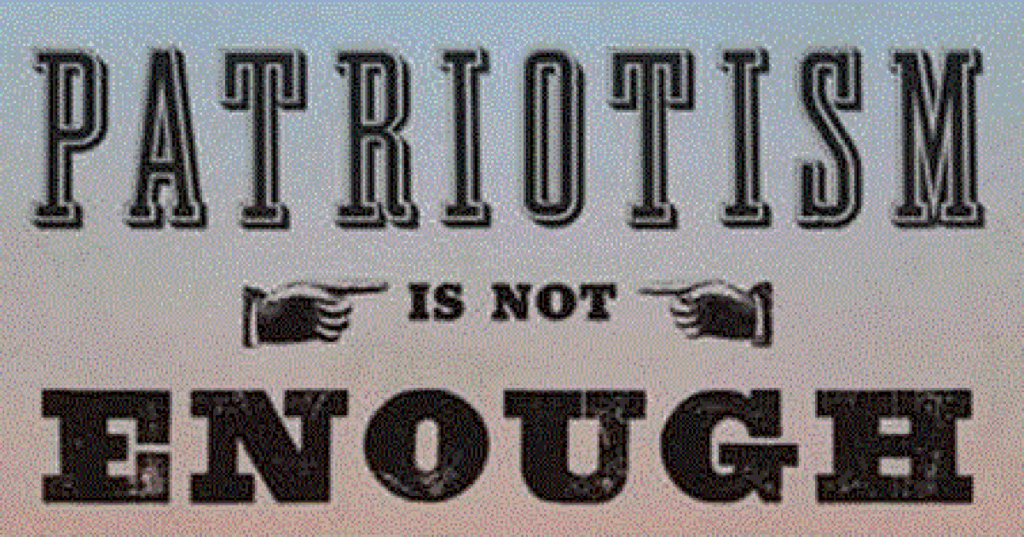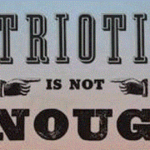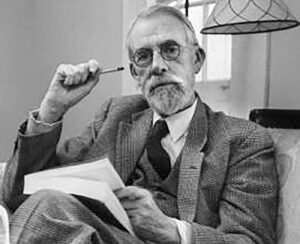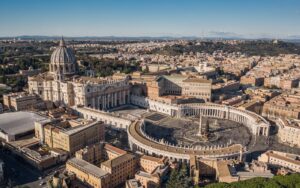Editor’s note: For Independence day this year, please enjoy Carson Holloway’s timeless review of Steven F. Hayward’s Patriotism Is Not Enough: Harry Jaffa, Walter Berns, and the Arguments that Redefined American Conservatism, from our archives (originally publish July 5, 2017).
The presidency of Donald Trump raises the question of patriotism more forcefully than it has been raised for a long time in American politics. On the one hand, Trump and his followers think of their movement as a restoration of a proper patriotism, an effort to rescue a country and a people, the true interests of which have been shamefully neglected by an excessively cosmopolitan elite. On the other hand, Trump’s critics think that he appeals to a dangerously atavistic nationalism, an unenlightened and extreme love of country that neglects our duties to the world community. Thus the Trump movement and the controversy it has created force us to ask: what is a just and reasonable patriotism? More specifically, what kind of patriotism is appropriate to a country like America, which is founded on universal principles and not on any particular and exclusive ethnic or religious identity?
This question is especially relevant for American conservatives. In general, patriotism looms larger in the minds of conservatives than in the minds of their liberal counterparts. Conservatism is about preserving, as much as circumstances permit, the country we have inherited, and such an enterprise necessarily presupposes patriotism—a loving approval of that country’s way of life and a desire to see it safely extended into the future. This is not to say that American liberals are unpatriotic. It is just that their patriotism is rendered more complicated, and perhaps more qualified, by their commitment to progress—which necessarily entails a belief that the country is imperfect, and hence more in need of improvement than of preservation—and by their commitment to cosmopolitanism—which leads them to think in terms of political obligations aside from, and maybe in some cases more compelling than, those they owe to their country.
The present question of patriotism is also more compelling for American conservatives simply because the Trump phenomenon arose on their own political turf. Trump is not a conventional American conservative, but his movement is certainly of the right. He has, for the present at least, taken over the traditional political instrument of American conservatism, the Republican Party. His candidacy first swept aside his conservative opposition and then co-opted a good deal of it. These reasons, too, force conservatives to ask themselves whether they can support the kind of patriotism to which Trump has so successfully appealed.
Start your day with Public Discourse
Sign up and get our daily essays sent straight to your inbox.In this context, American conservatives—and anyone interested in American politics—should welcome the publication of Steven F. Hayward’s Patriotism Is Not Enough: Harry Jaffa, Walter Berns, and the Arguments that Redefined American Conservatism. As his subtitle indicates, Hayward’s book offers in the first place an account of the intellectual journey of Jaffa and Berns, two students of Leo Strauss who became in their generation two of the leading scholars of American political thought and the American regime. Unlike their great teacher, however, Berns and Jaffa did not limit their intellectual activity to the realm of scholarly and philosophic inquiry. Strauss was primarily an interpreter of the great texts of the western philosophic canon, seeking to understand them on their own terms and to use them as a springboard for his own philosophizing. He rarely commented at length on any of the political questions of the day. In contrast, Jaffa and Berns chose to be both scholars and public intellectuals, offering commentary from roughly the right side of the political spectrum, Jaffa operating from the Claremont Institute and Berns from the American Enterprise Institute. Accordingly, the story of their thinking, of their agreements and disagreements, is to a considerable extent an account of many of the important issues with which conservative intellectuals have grappled over the last fifty years.
Although Hayward writes with a winning affection for Jaffa and Berns, both of whom he knew personally, his primary aim is not to provide a pair of intellectual biographies. Rather, his main interest lies with the key issues themselves, using Jaffa and Berns’s arguments to explicate them. The book is not and does not claim to be an academic study of Jaffa and Berns’s political thought. Indeed, for whoever wishes to take up the task, a scholarly book (perhaps beginning as a doctoral dissertation) remains to be written on Strauss’s first generation students who took up the study of the American regime, including not only Jaffa and Berns, but also Martin Diamond and Herbert Storing.
Hayward, however, writes here for a more popular audience of thoughtful citizens, offering them an accessible account of the questions that Jaffa and Berns pondered and that played an important role in conservative intellectual debate during their careers: Can modern political science be morally serious without being moralistic, avoiding the extremes of scientistic value neutrality, on the one hand, and ideological fanaticism, on the other? What is statesmanship, and how can it be guided by high principle while also accommodating the intractable imperfections inseparable from political life? To what extent can conservatives look upon Abraham Lincoln as a model of American statesmanship? What role, if any, should natural law and natural rights play in the exercise of the judicial power? Can equality be understood as an intelligible and limited political principle, or must it degenerate into an unreasoning and unquenchable passion?
All of the questions that Hayward explores are of perennial interest to students of American politics. Once again, however, none is of more immediate importance than the question of patriotism and its proper basis, which is a key theme of the book, as its title indicates. What does Hayward mean by asserting that “patriotism is not enough”? He seeks to remind us that, at least for a political community like the United States, a healthy politics requires more than just a sentimental attachment to the country and its interests. As he says, “American patriotism is based on ideas.” Unlike most countries, America was founded at a particular moment in time and, more importantly, on the basis of certain moral and philosophical principles to which its founders dedicated it. American patriotism, therefore, needs to be an enlightened patriotism, in the sense of being informed by knowledge of the founding principles and reflection on how to preserve them and apply them anew in each generation.
Put another way, America has a political identity much more distinct, and much more central to its being, than other nations, many of which have existed for a long time and maintained some kind of stable identity under a variety of regimes. At least until recently, a perfectly good Frenchman might be a republican, a monarchist, a socialist, or a communist. A good American, however, must be committed to a particular political creed: the natural rights doctrine of the Declaration of Independence and the republican self-government under law established by the Constitution. Accordingly, American patriotism, and American conservatism, is concerned with understanding and preserving this creed, the way of life to which it gives rise, and the institutions and mores that sustain it. This is the kind of patriotism and conservatism taught by both Harry Jaffa and Walter Berns, whatever disagreements they had on other questions.
Hayward’s book is so timely precisely because the kind of patriotism he discusses provides a useful corrective for Trump-style nationalism. The patriotism to which Trump appeals is almost entirely affective and hardly at all intellectual. As has been observed many times, he almost never refers to the Declaration of Independence, the Constitution, or the founding more generally. Instead of meditating on the country’s highest ideals, Trump usually expresses patriotic solicitude for its most elementary needs. He wants America and its citizens to be safe and prosperous.
One can see this, for example, in the way Trump talks about how immigration should be regulated. A conservative in the mold of Jaffa, Berns, and Hayward would remind us that the immigrants we admit should understand, believe in, and have the habits necessary to preserve the doctrine of natural rights and constitutional self-government. Trump has never said anything like this, but has instead simply held that we need to make sure that the immigrants we let in “love our country and love our people.”
As Hayward’s book rightly reminds us, Trump’s emotive patriotism is “not enough.” As a candidate for the presidency, Trump was once asked in what sense he is a conservative. He replied that he wants to “conserve the country.” There is no reason to doubt his sincerity in this. Trump seems to be animated by a genuine protectiveness for America and its citizens. Nevertheless, one has to admit that the country cannot be conserved or preserved without going beyond sentimental patriotism and adding an intellectual appreciation for the founding principles and disciplined thought about how to carry them forward. An America that is safe and prosperous, but not committed to constitutional self-government and natural rights, would no longer be the same country.
This is not to say, however, that there is anything wrong with the kind of patriotism to which Trump appeals. That it is insufficient does not make it irrelevant. Feelings of love for the country one inhabits—irrespective of its regime or form of government—are a natural and just human impulse. Among American statesmen, there has been no greater teacher of philosophic, principled patriotism than Abraham Lincoln. Nevertheless, even Lincoln admitted the legitimacy of the more elementary patriotism to which Trump appeals. In his famous eulogy on Henry Clay, Lincoln noted with approval that Clay loved his country both because it was a “free country” but also in part because it was simply “his own country.”
Moreover, Trumpian patriotism is politically effective not only because it speaks directly to the simple and untutored love of country that any ordinary person feels, but also because it addresses the vital link between the nation’s well-being and the self-interest of individual citizens. Thus Trump denounces certain trade practices, for example, as not only bad for the country, but also as contrary to the economic interests of the working- and middle-class voters whose votes he sought and won. This is, to be sure, not the lofty, principled politics of, say, Lincoln’s effort to preserve respect for the equality of rights promised by the Declaration of Independence. But neither is there anything illegitimate about it by realistic political standards. On the contrary, the American founders themselves recognized and taught openly that most ordinary political activity is animated by self-interest. Thus, when Trump appeals so directly to the economic interests of those whose support he courts, he is only doing what the founders expected that politicians would do as a matter of course.
Accordingly, we can say not only that Hayward’s principled patriotism provides a useful corrective to Trump’s emotive and interest-based nationalism, but also that Trump’s nationalism provides a useful corrective to a patriotism based only on philosophic principle. They are mutually correcting and mutually supportive. On the one hand, a patriotism that is based only on the principles of the founding cannot succeed in winning elections, because voters rightly demand that any political movement that seeks their support have some plausible plan to address their ordinary interests. On the other hand, a patriotism that is based only on the untutored loves and interests of ordinary voters cannot preserve our precious inheritance of a regime based on natural rights, the rule of law, and self-government. A movement that acknowledges each of these concerns amounts to the kind of patriotism, and the kind of conservatism, that can both win elections and deserve to win them.














